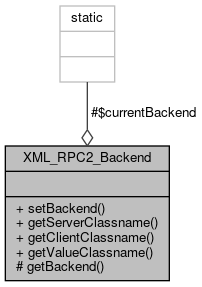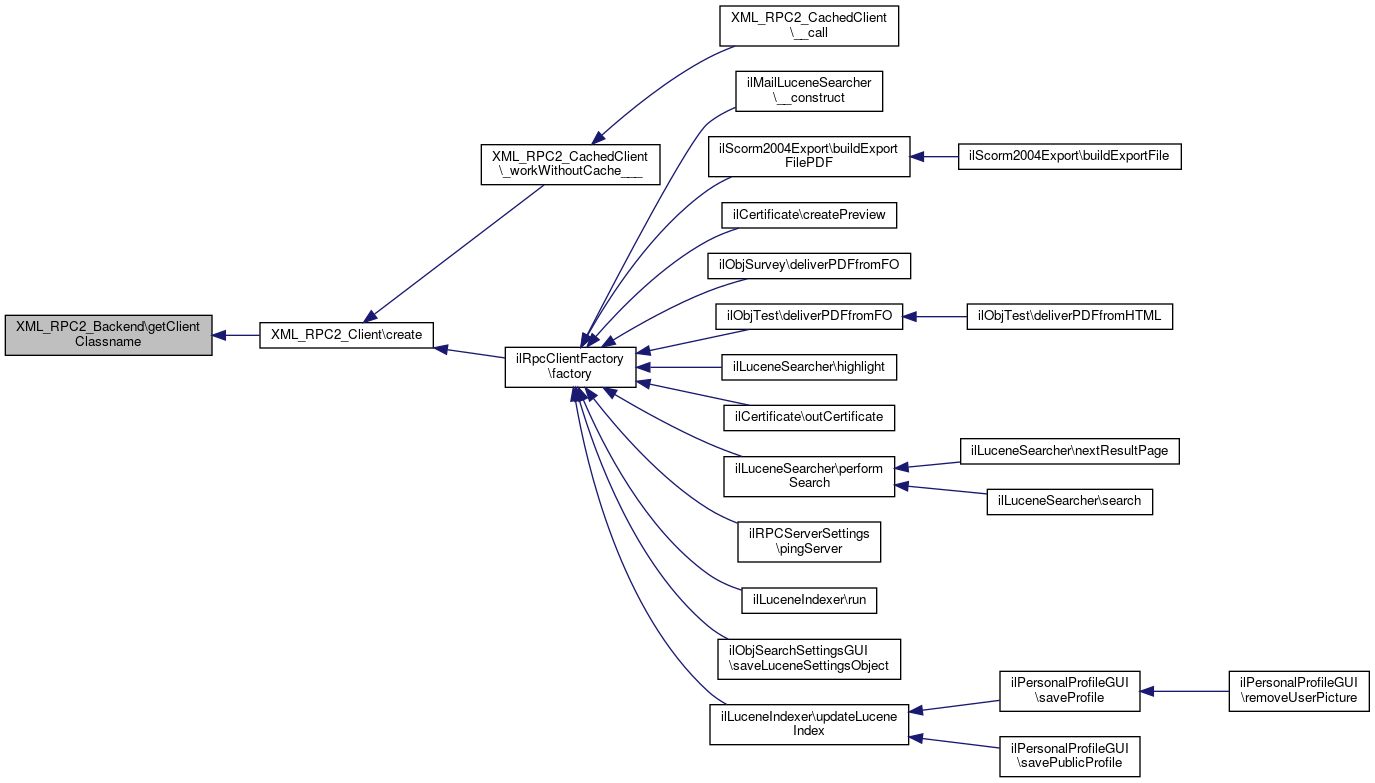 Collaboration diagram for XML_RPC2_Backend:
Collaboration diagram for XML_RPC2_Backend:Static Public Member Functions | |
| static | setBackend ($backend) |
| Backend setter. More... | |
| static | getServerClassname () |
| Include the relevant php files for the server class, and return the backend server class name. More... | |
| static | getClientClassname () |
| Include the relevant php files for the client class, and return the backend client class name. More... | |
| static | getValueClassname () |
| Include the relevant php files for the value class, and return the backend value class name. More... | |
Static Protected Member Functions | |
| static | getBackend () |
| Backend getter. More... | |
Static Protected Attributes | |
| static | $currentBackend |
Detailed Description
Definition at line 70 of file Backend.php.
Member Function Documentation
◆ getBackend()
|
staticprotected |
Backend getter.
Return the current backend name. If no backend was previously selected select one and set it.
The xmlrpcext backend is preferred, and will be automatically selected when no explicit backend has been set and the xmlrpc extension exists. If it does not exist, then the php backend is selected.
- Returns
- string The current backend
Definition at line 135 of file Backend.php.
◆ getClientClassname()
|
static |
Include the relevant php files for the client class, and return the backend client class name.
- Returns
- string The Client class name
Definition at line 171 of file Backend.php.
Referenced by XML_RPC2_Client\create().
 Here is the caller graph for this function:
Here is the caller graph for this function:◆ getServerClassname()
|
static |
Include the relevant php files for the server class, and return the backend server class name.
- Returns
- string The Server class name
Definition at line 157 of file Backend.php.
Referenced by XML_RPC2_Server\create().
 Here is the caller graph for this function:
Here is the caller graph for this function:◆ getValueClassname()
|
static |
Include the relevant php files for the value class, and return the backend value class name.
- Returns
- string The Value class name
Definition at line 185 of file Backend.php.
Referenced by XML_RPC2_Value\createFromNative().
 Here is the caller graph for this function:
Here is the caller graph for this function:◆ setBackend()
|
static |
Backend setter.
Currently, two backends exist: 'php' and 'XMLRPCext'. The PHP backend has no external dependencies, while the xmlrpcext requires the xmlrpc extension.
The XMLRPCext backend is quite faster, and will be automatically selected when no explicit backend has been set and the extension is available.
- Parameters
-
string The backend to select. Either 'php' or 'XMLRPCext'.
Definition at line 98 of file Backend.php.
Referenced by XML_RPC2_Server\create(), and XML_RPC2_Client\create().
 Here is the caller graph for this function:
Here is the caller graph for this function:Field Documentation
◆ $currentBackend
|
staticprotected |
Definition at line 80 of file Backend.php.
The documentation for this class was generated from the following file:
- Services/PEAR/lib/XML/RPC2/Backend.php





